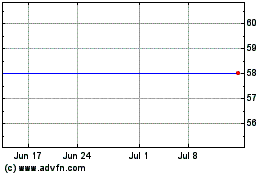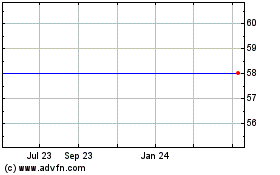2nd UPDATE: Court Upholds FCC Ban On Exclusive Cable Contracts
March 12 2010 - 1:55PM
Dow Jones News
A divided federal appeals court on Friday upheld the Federal
Communications Commission's decision to extend a rule that bars
cable operators from withholding channels from competitors.
The decision essentially upholds the status quo for cable
operators. It means cable companies like Comcast Corp. (CMCSA)
can't try to use their partial ownership of popular channels like
E! or the Golf Channel as a competitive advantage by preventing
rivals from carrying them.
Cablevision Systems Corp. (CVC) and Comcast had challenged the
FCC's decision to keep the rule in place, arguing that the
prohibition was no longer necessary to preserve competition in the
pay-TV market.
The U.S. Court Appeals for the District of Columbia Circuit said
it's reasonable to conclude that the FCC's prohibition may not be
necessary "if the market continues to evolve at such a rapid
pace."
However, the court upheld the agency's authority to make that
decision. It rejected the cable operators' challenge in a 2-1
ruling.
The court's majority said it was reasonable for the FCC to
conclude that the ban on exclusive contracts between cable
operators and affiliated cable programmers continued to be
necessary.
In a 29-page dissenting opinion, Judge Brett M. Kavanaugh argued
that the case was really about the First Amendment rights of cable
operators.
The FCC's desire that every pay-TV provider have access to the
same channels isn't much different than the government telling
"Barnes & Noble what publisher's books it had to sell, or
telling a bookstore-affiliated publishing company that it had to
make certain books available to all bookstores," he wrote.
The ban on exclusive contracts for TV channels was set by
Congress in 1992. At the time, lawmakers were concerned that cable
companies could withhold popular channels, particularly local
sports networks, that they owned from competitors, effectively
creating a monopoly.
Congress requires the FCC to examine the rule every 10 years to
determine if it's still necessary. In 2002, the agency decided to
extend the ban for another five years.
It did the same thing in 2007, although it noted cable operators
did face more competition from satellite-TV providers and phone
companies like Verizon Communications Inc. (VZ). The agency decided
to extend the ban, however, after noting that six of the top 20
national cable networks and almost half of regional sports channels
were owned by the four largest cable providers.
In a statement, Cablevision said the FCC's rules are "based on
an outdated and obsolete view of the competitive landscape," and
favor broadcasters and other pay-TV providers.
Comcast agreed, issuing a statement saying it was disappointing
that the court "preserved the current unfairness that allows
DirecTV to have exclusives for NFL Sunday Ticket and NASCAR Hot
Pass while restricting the exclusives that cable operators may
have."
FCC Chairman Julius Genachowski said the agency was pleased with
the court's decision.
"The Commission's program access rules have played a vital role
in making diverse and attractive video programming available to
cable and satellite TV viewers," he said in a statement.
The case is Cablevision Systems Corp. v. FCC, 07-1425.
-By Amy Schatz, The Wall Street Journal; 202-862-6631;
amy.schatz@wsj.com
-By Brent Kendall, Dow Jones Newswires; 202-862-9222;
brent.kendall@dowjones.com
DTE Energy (NYSE:DTV)
Historical Stock Chart
From Jun 2024 to Jul 2024

DTE Energy (NYSE:DTV)
Historical Stock Chart
From Jul 2023 to Jul 2024
